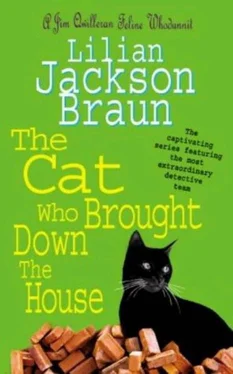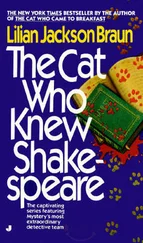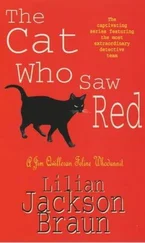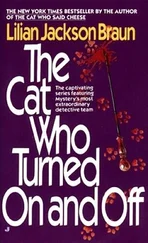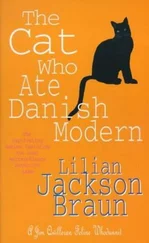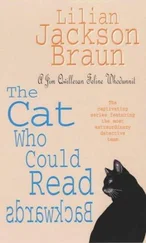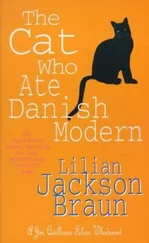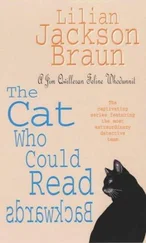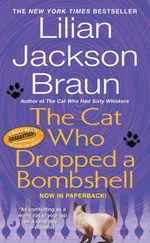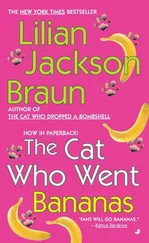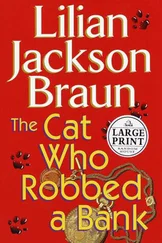Lilian Braun - The Cat Who Brought Down the House
Здесь есть возможность читать онлайн «Lilian Braun - The Cat Who Brought Down the House» весь текст электронной книги совершенно бесплатно (целиком полную версию без сокращений). В некоторых случаях можно слушать аудио, скачать через торрент в формате fb2 и присутствует краткое содержание. Год выпуска: 2003, ISBN: 2003, Издательство: Jove, Жанр: Старинная литература, на английском языке. Описание произведения, (предисловие) а так же отзывы посетителей доступны на портале библиотеки ЛибКат.
- Название:The Cat Who Brought Down the House
- Автор:
- Издательство:Jove
- Жанр:
- Год:2003
- ISBN:9780515136555
- Рейтинг книги:4 / 5. Голосов: 1
-
Избранное:Добавить в избранное
- Отзывы:
-
Ваша оценка:
- 80
- 1
- 2
- 3
- 4
- 5
The Cat Who Brought Down the House: краткое содержание, описание и аннотация
Предлагаем к чтению аннотацию, описание, краткое содержание или предисловие (зависит от того, что написал сам автор книги «The Cat Who Brought Down the House»). Если вы не нашли необходимую информацию о книге — напишите в комментариях, мы постараемся отыскать её.
The Cat Who Brought Down the House — читать онлайн бесплатно полную книгу (весь текст) целиком
Ниже представлен текст книги, разбитый по страницам. Система сохранения места последней прочитанной страницы, позволяет с удобством читать онлайн бесплатно книгу «The Cat Who Brought Down the House», без необходимости каждый раз заново искать на чём Вы остановились. Поставьте закладку, и сможете в любой момент перейти на страницу, на которой закончили чтение.
Интервал:
Закладка:
Today we paint them all-white, giving rise to the “wedding cake’ sobriquet.
When the time came to put up sign boards, Angus was at a loss for a street name. He said, “I don’t want anything personal like Campbell or Glasgow... or anything sobersides or high-sounding... just something pleasant.”
And Great-Grandma Anne said with sweet feminine logic: “Call it Pleasant Street.”
“And folks have lived there happily ever after,” Qwilleran said as he turned off the recorder. “I don’t even know who my grandparents were, so I'm envious of a fourth-generation native.”
“I wanted to make it five generations,” Burgess said, “but it didn’t work out. I grew up with the girl next door and we were good friends. I always thought we’d marry some day, but she went away to college and never came back. Now she has three kids that should have been mine. But her parents still treat me like a son-in-law. And I treat students who lodge with me on the second floor with fatherly concern.”
Qwilleran said, “They’re very lucky! I hope they all turn out to be a credit to you... and how do you feel about the people who own the houses on your land?”
“We work together to keep Pleasant Street pleasant, solve problems, and so forth.”
“Has the California contingent arrived?” Qwilleran asked casually.
“They’re due this afternoon,” Burgess said. “My housekeeper, Mrs Richards, periodically goes over with coffee and cookies—in the guise of neighborliness but actually because she and I are burning with curiosity. The moving van arrived Monday. Since then, Fran’s helpers have worked around the clock, unpacking and getting everything settled. The house looks as if they had lived there for weeks!”
“One question,” Qwilleran asked. “Do you know anything about the Thackeray family?”
“I certainly do!” was the prompt answer. “Thelma’s father was a potato farmer who struck oil—as the saying goes—during Prohibition. Her brother was a veterinarian who believed in holistic medicine, and the Thackeray Clinic was one of the finest in this part of the country. I took Alexander to him for regular checkups. Dr Thurston’s love of animals was such that they looked forward to visiting him. He was healthy and an outdoorsman and should have lived another ten years at least, but he fell to his death while hiking alone on the rim of the Black Creek Gorge. Tragic! The pity of it is: There are nasty rumors in circulation—which I prefer not to repeat.”
A horn sounded in the barnyard, and Qwilleran walked with his visitors to the car. “One question, Burgess. Fran said the reception was for adults only—”
“Ah, yes! There’ll be a party at the Adams house for the six kids in the neighborhood, ages seven to ten. Mavis’s two teen daughters will supervise. They’re accustomed to working with youngsters. They tell me there’ll be games with prizes, movies—such as Disney’s Lady and the Tramp and/or The Incredible Journey. Music will be Sixties-style. Refreshment—four kinds of pizza and make-it-yourself sundaes... The Adams girls are very well organized and very responsible... And I forgot—favors to take home. Chocolate brownies.”
Qwilleran said, “Sounds better than the champagne reception.”
Alexander gently nudged Burgess toward the passenger door of the car, and they drove away.
The next evening Qwilleran and Polly would be dining at the newly named, newly decorated Grist Mill. She always dressed carefully for such occasions and had phoned the restaurant to inquire about the color scheme. It was jade green. So she would wear her dusty rose suit.
She reported this vital information to Qwilleran during their nightly phone-chat.
By a strange coincidence he was writing a think piece on green for his next ‘Qwill Pen’ column. He boasted that he could take any noun or adjective and write a thousand words about it. Now the word was green. First... he made notes:
·
It’s the fourth color in the spectrum: red, orange, yellow, GREEN, blue, violet. Why is it more talked about than other colors?
·
In big-city phone directories there are hundreds of Greens—and a few Greenes.
·
Yet, there has never been a President Green in the White House.
·
Why is blue more popular in clothing and the home? How do you feel about green jeans?
·
Why does Santa wear red instead of green?
·
Why do crazy kids dye their hair green?
·
Green trees fight pollution. Green veggies are good for you.
·
Green rhymes with mean. Monsters are green eyed. Nobody likes to be called a greenhorn. “It’s not easy being green,” according to the song.
·
We have green alligators, green snakes, and green grasshoppers. Why no animals with green fur?
“Yow!” came an indignant comment. It was a reminder that it was eleven o’clock and time for a bedtime snack.
Chapter 7
In dressing for dinner at the Grist Mill, Qwilleran had chosen light olive-green slacks and a lighter olive-green shirt to wear with his tan blazer, and he had gone to Scottie’s Men’s Store for a deeper olive-green tie with a tan motif. His interest in coordination amazed Arch Riker, who had known him in his earlier, or ‘slob,’ period. Now Qwilleran had Polly to please, a host of admirers to impress, and a little money to spend.
Driving to the Grist Mill, they talked about the new animal-welfare project being launched in Moose County. The attorney, Mavis Adams, was spearheading it. It was being called the Kit Kat Agenda.
Polly said, “Its thrust is to stop the euthanasia of unwanted kittens. They’re going to stage a show to raise funds.”
“Mavis writes clever letters to the editor,” he said. “She lives on Pleasant Street.”
“I wonder how Thelma will fit into the neighborhood?”
Polly said, “Guess who came into my office today? Thelma Thackeray’s assistant! She took out library cards for both of them and then came to my office to introduce herself and make an offer. She was conservatively dressed, soft-spoken, very nice—fortyish, I guess—and obviously devoted to her boss.”
“What was the offer?”
“Well, Thelma has a collection of autographed photos of old movie stars that she’ll lend us for an exhibit. I assured her that we have a locked case for such exhibits. Clark Gable, Mae West, John Wayne, Joan Crawford, etc.—isn’t that exciting?”
“If you say so,” he said.
“There’s even a signed print of a photo that appeared on the cover of Time magazine: Hedda Hopper wearing a hat made of a typewriter, a microphone, and a script.”
Before Qwilleran could react, they arrived at the Grist Mill. “You must tell me more later,” he said.
It was the same ancient stone mill with cavernous interior and exposed timbers, but color had been added: jade green table linens and carpet in a darker shade of jade green. And the rough stone wall was hung with farm implements of the nineteenth century.
They were greeted in the lobby by Elizabeth Hart, one of the three owners, wearing a silk coolie suit in jade green. Towering over the maître d’s station was the six-foot-eight Derek Cuttlebrink. He showed them to a choice table—under a murderous-looking scythe.
Qwilleran said, hope that thing is securely attached to the wall.”
Polly said, “You have a fortune invested in antique farm equipment!”
In a lowered voice Derek said, “Don’t let on that I told you, but Liz got them from Hollywood—props from a movie.” Then he added, “One dry sherry and one Qwilleran cocktail?”
The tables were filling rapidly with guests excited about the restaurant’s opening. The menu was new and appetizing. Polly ordered three small courses: mushroom bisque, deviled crab en coquille, and a Cobb salad. Qwilleran ordered minestrone, oysters Rockefeller, and the surf-and-turf special, and no salad. Polly said, “If Mildred were here, she’d make you eat some leafy greens.”
Читать дальшеИнтервал:
Закладка:
Похожие книги на «The Cat Who Brought Down the House»
Представляем Вашему вниманию похожие книги на «The Cat Who Brought Down the House» списком для выбора. Мы отобрали схожую по названию и смыслу литературу в надежде предоставить читателям больше вариантов отыскать новые, интересные, ещё непрочитанные произведения.
Обсуждение, отзывы о книге «The Cat Who Brought Down the House» и просто собственные мнения читателей. Оставьте ваши комментарии, напишите, что Вы думаете о произведении, его смысле или главных героях. Укажите что конкретно понравилось, а что нет, и почему Вы так считаете.
